Artificial Intelligence apps in the creative industries have skyrocketed in recent years. The output from a new generation of text and image generators is astounding. And, now AI is also being used in the music industry. So, are you interested to know about text-to-musicAI tools that can create original melodies? If yes, then stay here and read this article that is written for you. Here, you will get to know the different text-to-music AI generators in detail.
Are you ready? Let’s get started then!
In this article
Part 1: What is AI Music Generator?
Before knowing the different text-to-music AI generators, let’s define what is AI music generator is.
When patterns, loops, chords, and melodies are combined, a computer technique known as an AI music generator creates music. Artificial Intelligence algorithms are used by AI music generators to generate a unique soundtrack after the user has chosen their preferred genre. Users can upload videos to test if the AI music generator can match the sound they're searching for. AI music generators also let users the duration and structure of each song made.
Part 2: Best AI Music Generators from Text to Create Unique Music
Now that you know what an AI music creator is and how it functions, it's time to learn about different AI music generators from the text.
Here, I am sharing the top AI music generators that are used to create sounds from text using AI technology.
1. Voicemod
The AI music maker Voicemod Text to Music is fully browser-based. In other words, you may quickly make free text-to-song music online from your smartphone or desktop computer. You can share your song with anybody you want, wherever you are after you've finished producing it. Moreover, Voicemod is not that difficult to use.
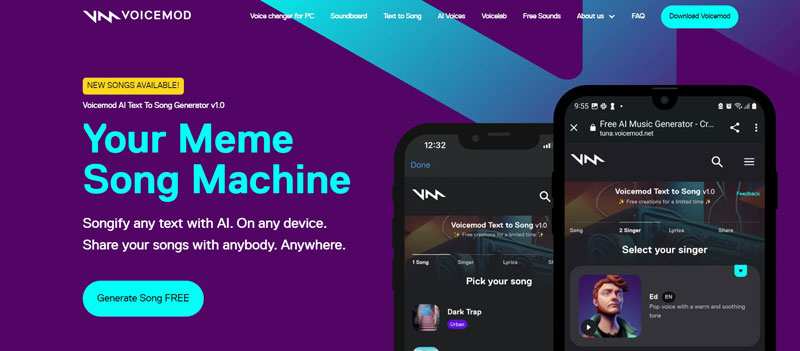
Use this AI text-to-speech feature to create tunes from texts by following these three steps:
Step 1: You will need to select a song first. The options are constrained because Voicemod only provides 10.
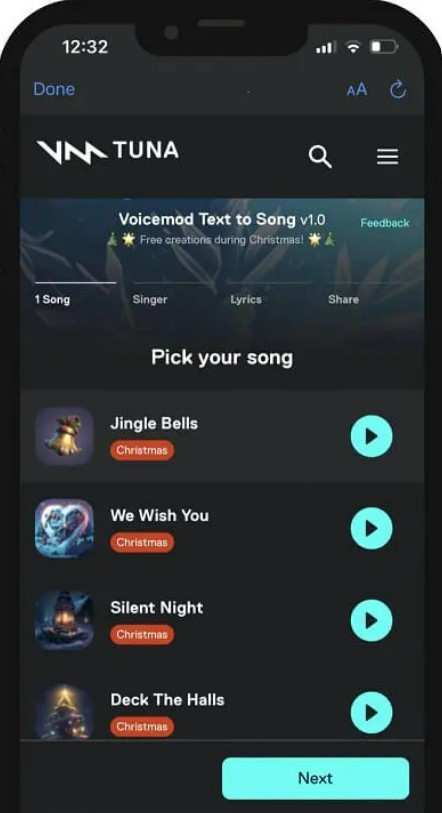
Step 2: Then, pick a singer. Voicemod provides seven singing voices. Choose the voice that best fits the song you have composed after listening to each of their demos.
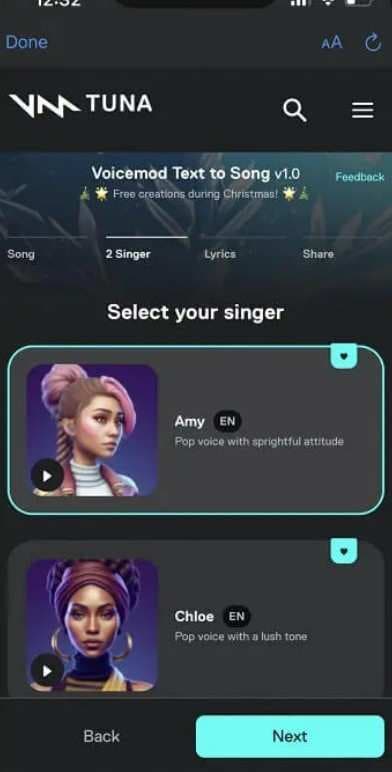
Step 3: Next, text can be typed or pasted. The text will subsequently be converted into a song by the AI algorithm.
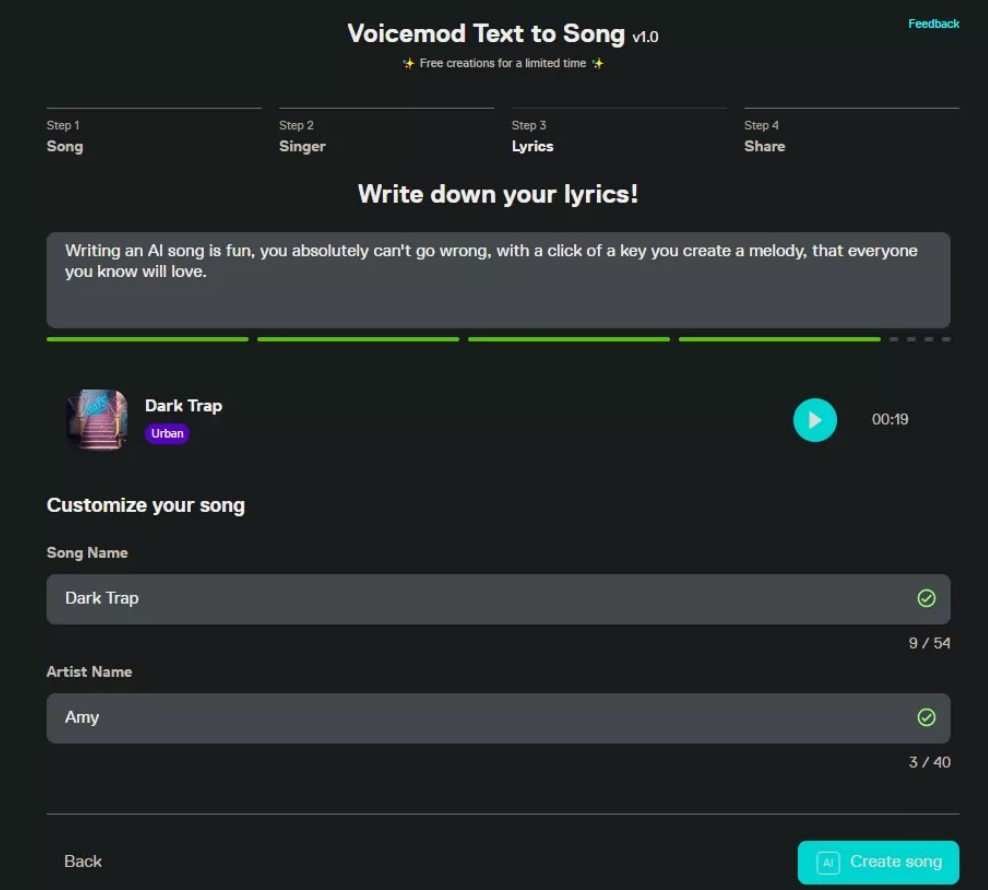
So, using Voicemod text-to-song isn't that difficult. Now, it’s time to learn its benefits and drawbacks.
Benefits of Voicemod
- It is a music meme generator.
- AI is used to produce sounds and effects.
- Features a voice-changing option as well.
- 7 vocalists' voices are available.
Drawbacks of Voicemod
- New users may find the interface challenging to understand.
- There are only 10 melodies available.
- Also restricted are the sound effects.
2. Melobytes
Melobytes is another text-to-music AI tool that you can use online. It turns the lyrics into a distinctive tune by analyzing them. The language, time signature, pace, intonation, and performer type of the lyrics are all easily adjustable. It enables you to contribute your lyrics for unique music production, but you may also import words from a well-known song.
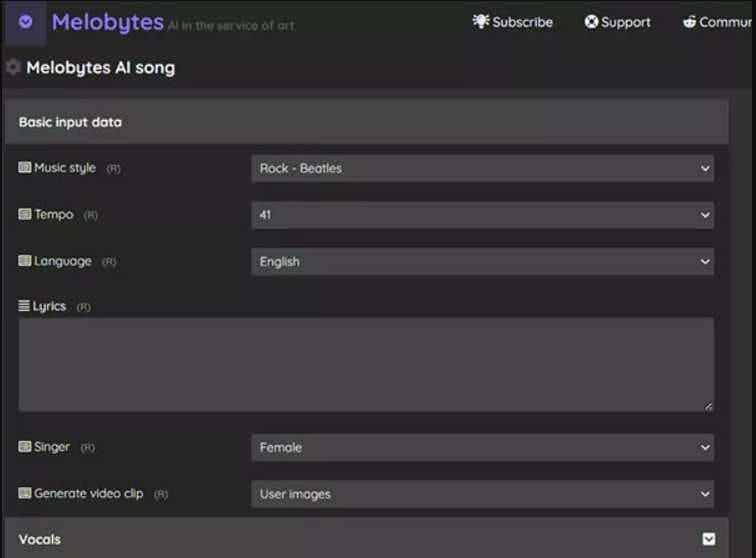
Benefits of Melobytes
- Give you bot templates so you may construct a chatbot for conversations
- Provide a visual drag-and-drop builder that is easy to use.
- Sync up with a variety of programs, including MailChimp, Zapier, and others.
Drawbacks of Melobytes
- There could be issues with the chat icon.
- It was unable to sync with messaging services like WhatsApp, Telegram, etc.
Part 3: Google’s New AI Music Generator from Text to Create Melodies
Google announced MusicLM earlier this week, a text-prompt music generator that can produce 24 kHz musical sounds from word descriptions. For text-based AI generators, this is another advancement. As many people are aware, text-based picture generators have been all over the news lately, MusicLM is still modern in generative AI technology.To create music on Google AI, MusicLM, according to the study report, was trained on a dataset of 280,000 hours of music.
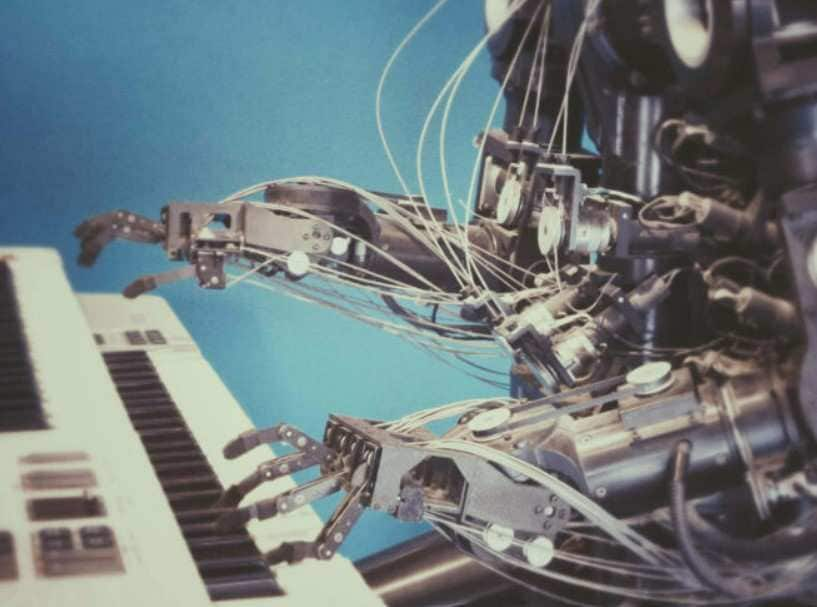
So, How Exactly Does This New AI Model Function?
There are two components. To train captions, it first takes audio tokens, or little fragments of sound, and maps them into words. Semantic tokens would be these. To create what is known as acoustic tokens, the program then accepts user captions and/or audio input. These sound segments are composed of the output that was obtained.
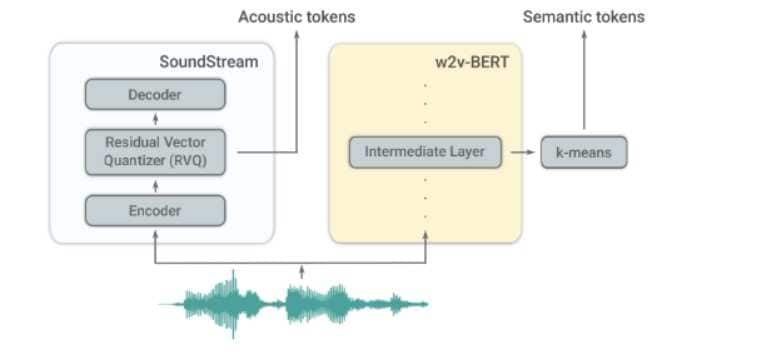
Features of MusicLM
Here are some features of Google Text to Music AI:
- MusicLMcan create music that resembles works by real musicians.
- It can expand upon current melodies, whether they are whistled, hummed, sung, or played on an instrument.
- The system can take a series of written descriptions and combine them to produce a melodic "story" or narrative that can last up to several minutes.
- MusicLM can produce sounds that are "played" by a particular kind of instrument in a particular style.
Flaws of MusicLM
MusicLM does have some drawbacks. Here are some flaws ofGoogle Music AI:
- As a necessary byproduct of the training procedure, the system's samples have a skewed quality.
- While MusicLM is capable of producing vocals, including choir harmonies, their quality is lacking.
- The majority of the "lyrics" have computer-generated voices that sound like a combination of many performers. They range from understandable English to completely incomprehensible.
- The biggest flaw is that Google does not intend to release MusicLM anytime soon and that it is not currently available to the general public.
So, why MusicLM is not available?
One word can adequately describe the issue: copyrights.
According to the white paper, MusicLM has the propensity to reproduce the music it was trained on. The team discovered that 1% of the music created on the system contained copyrighted content.
Conclusion
Here, in this article, I have explained the best text-to-music AI generators that are used to convert text into original melodies. However, Google has recently introduced a new AI model-MusicLM. But the Google Music AI model is yet not available to the public. As the percentage of copyright content is too high, it is less probable that MusicLM will become a widely used application shortly.
FAQ
-
How does AI improve music?
AI is used for music creation, data analysis, and personalized music suggestions. -
Who employs AI in music, and why?
Tech companies, music producers, and musicians are all utilizing AI to create and enhance the music. -
How is AI influencing the way music is produced?
AI enables musicians to produce music faster, collaborate remotely, and experiment with new sounds. -
What is the AI behind text-to-music conversion?
The most recent AI technology from Google, called MusicLM, can produce music in any genre from a text description. Additionally, it may change a tune that is whistled or hummed into different instruments.
